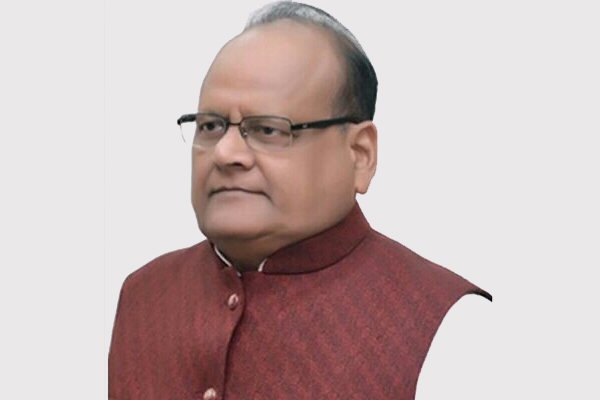

Minister for Medical, Health and Family Welfare, Government of Rajasthan
Premature mortality and illness due to NCDs present a growing health and development challenge. The cost for economies, health systems, households and individuals is already substantial, and is set to increase significantly if action is not taken to stem the rise of NCDs, says Kali Charan Saraf, Minister for Medical, Health and Family Welfare, Government of Rajasthan, in an interview with Kartik Sharma and Rajbala of Elets News Network (ENN).
What are your priorities to improvise or boost Rajasthan healthcare system?

I believe that healthcare must be a core priority of every State. With this thought, we always seek to implement and ute programmes which could boost quality healthcare delivery in the country.
In order to provide treatment to the patients in remote areas, we have boosted telemedicine services across the State. To enhance telemedicine services, we have signed MoUs with various firms which could help in providing treatment and consultation to patients till last mile.
Major hospitals and health centres across the State are being connected through telemedicine which provides consultation through video conferencing.

Apart from this, we have started medical courses at colleges, institutions and Universities. With this step, we look forward to overcome the challenge of scarcity of medical professionals and doctors. In addition to that we have also started training centres to qualify doctors working at primary level.
Thirdly, to deal with emerging diseases like cancer, diabetes, mental health, and other ones we have launched programmes like NCPDCs, etc. We are also strengthening the public service delivery infrastructure, particularly at primary as well as secondary levels. Our department has improved management capacity to organize health systems and services in public health.
How big is the Non- Communicable Diseases challenge for the people of Rajasthan? Are we prepared to tackle it?
Premature mortality and illness due to NCDs present a growing health and development challenge. The cost for economies, health systems, households and individuals is already substantial, and is set to increase significantly if action is not taken to stem the rise of NCDs. Lack of knowledge about the NCDs in major threat as people still take these diseases as a general issue when at initial stage. Scarcity of specialists at primary level is another danger to healthcare situation.
But we are very aggressively working to control NCDs in the State by implementing various programmes. Likewise, we have started free screening at door steps to prevent disease at initial level and refer required treatment if needed. We have centralised the access to public health services for Womens health, Child health, water, hygiene, sanitation and nutrition.
To keep hold on growing danger of NCDs we have created accessible integrated comprehensive primary healthcare. One of the major steps to tackle NCDs our Department is ensuring population stabilization, gender and demographic balance in the State.
What is your take on child sex ratio in Rajasthan?
We accept that fact that Rajasthan has one of the lowest Girl Child Sex Ratio in the country due to female foeticide. The sex composition of the Indian population has so far been discussed within the prevailing understanding of the reasons behind a declining child sex ratio: The use of prenatal diagnostic techniques followed by sex-selective abortion, female child neglect and female infanticide. Attention needs to shift towards those families who, under the influence of the prent small family norm and son preference, stop producing children when one or two sons are born.
Child sex ratio reflects both, pre-birth discrimination manifested through gender biased sex selection, and post birth discrimination against girls. Skewed sex ratios can have far-reaching adverse social consequences. As evidence from regions with sex ratio imbalances indicate, it could contribute to increased violence against women, trafficking, increase in practices such as polyandry and overall rise in crime and general social disorder.
To ensure child sex ratio, various initiatives have been taken like implementation of laws concerning women and girls, review schemes for women, addressing trafficking issues, ensuring civil registration, enforcement of programmes, and promoting awareness programmes.
Child sex ratio reflects both, pre- birth discrimination manifested through gender biased sex selection, and post birth discrimination against girls. Skewed sex ratios can have far-reaching adverse social consequences.
What you think has helped in improvising sex ratio at birth in Rajasthan?
 The Health Department of the State has taken various initiatives which led to improvement in sex ratio at birth in Rajasthan. Initiatives like community mobilisation, toll free complaint services, revamped informer scheme, and other enforcement programmes led to enhancement in sex ratio at birth.
The Health Department of the State has taken various initiatives which led to improvement in sex ratio at birth in Rajasthan. Initiatives like community mobilisation, toll free complaint services, revamped informer scheme, and other enforcement programmes led to enhancement in sex ratio at birth.
Additionally, we have integrated tracking devices in Sonographic machines, started red alert SMS system, established PCPNDT Bureau of Investigation, and deployed maximum technology innovations.
Be a part of Elets Collaborative Initiatives. Join Us for Upcoming Events and explore business opportunities. Like us on Facebook , connect with us on LinkedIn and follow us on Twitter , Instagram.












